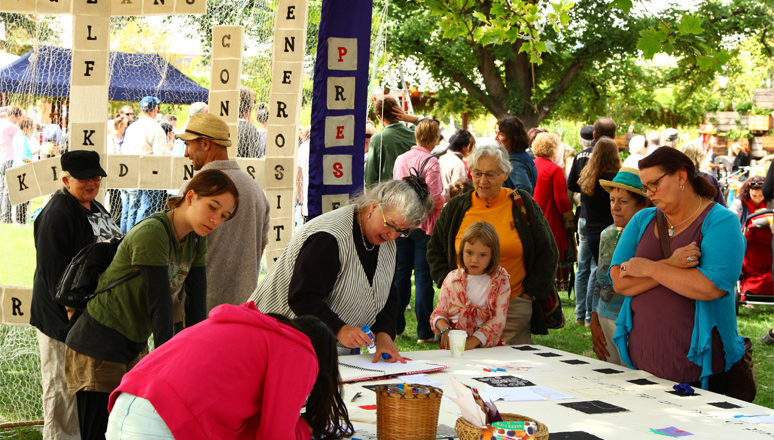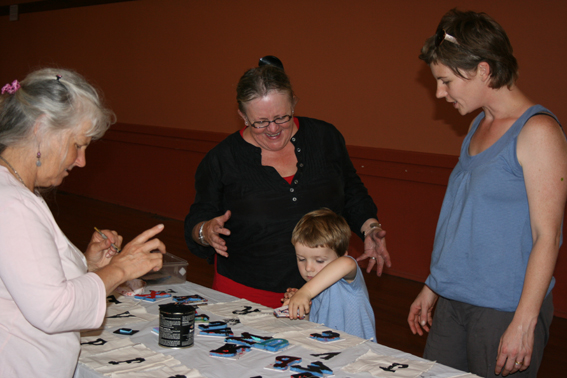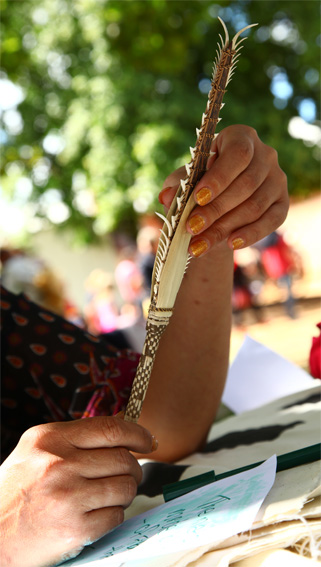
By Berni M Janssen. This article is part of our April and May focus on Art and Human Rights
The Preserves Project is a multi-arts project celebrating the ways people from different cultural backgrounds preserve, share and pass on what they value.
The trees are heavy with fruit, not every year, but when the season has the right mix of rain and sun. The phone rings and it is our neighbour, Alf, born here, and now in his nineties. He has lived here all his life, remembering when the first car drove by when he was a very small boy, running to look at the tyre marks left on the dusty road. How excited he was. He grows, like so many of his neighbours, fruit, vegetables, flowers. All his life he has tended his gardens. All his life he has cared about his neighbours, the people who live in this very small community. He remembers as a child, when there was a fire, whether it be a home or a paddock, word would spread rapidly and everyone was there with “bags and beaters”, others forming a “bucket brigade”. Even the children. People looked out for and looked after, each other. Alf often speaks at community events of the importance of neighbours and community. He is a storyteller, in the tradition of the laconic and humorous, with numerous stories of people lending a hand, whether it be the simple act of helping a neighbour fix a flat tyre, or bringing in food when the “kiddies” are ill. Or as Alf still does, phones his neighbours to say, “I’ve a lot of pears, do you want some?” Any number of people will pick some fruit, to be used immediately or to be preserved – jams, pickles, chutneys. These too are often shared and exchanged. It is this simple exchange that helps to build the bonds between neighbours. As Alf well knows.
Alf grew up, on hard land, in hard times, and everything was used – bottles, tins, bent nails, bits of wire and string. You could never tell when you might need it. Anything could be re-purposed. Nothing was ever wasted. Then it was quite a walk, or ride to the closest shops, and it still is a drive away. You have to be more self reliant. It’s a way of living, nothing romantic or pedantic about it. That adage “waste not, want not”, arose from sheer necessity, and now with rampant consumerism devouring resources, it is one we need to practice again.
Yet this tradition is not specific to the “country”, or to a time. Wasting nothing, using everything, sharing and exchanging seasonal produce, “preserving”, are all found across cultures and traditions. As are people making things together, exchanging secrets of practice, special techniques, stories and laughter. Knowledge is shared, passed on. For knowledge and practices can be lost between generations, or in transit from one place to another.
Ways of life, of people, of cultures can be left behind or lost forever. Languages, habitats, species, are disappearing. Not all precious things survive. We also cannot preserve what we don’t know about or understand. Whether it is making jams and chutneys, creating habitat for an endangered frog, learning your mother’s language, the art of preserving requires thoughtful attention, time, and patience. As many people have said in conversation throughout the project, to ensure what we value is saved for the future, there is a need for “mindfulness”.
Preserving is an art of transformation. It is not about holding on to traditions, as an act of nostalgia, but that traditions and ways of living, are necessarily dynamic, shift and respond to changing circumstances. They will be the same, but different, in response to place, technologies, lack or abundance. It is in this that new ways of doing and being are discovered.
In a time where we are concerned about human impact, on the environment and on other cultures, the values and approaches that underpin the culture and tradition of “preserving” are integral to our living into the future. We ask – What do we value? What do we want to preserve? What do we need for the future? What do we choose to save for the future? What future do we want? What future do we envisage? What do we need to do to ensure that we as individuals and a community can build towards that vision? These are important questions for any person or community to address.
The Preserves Project was initially a response to observing local acts of sharing and preserving produce, the need to capture stories from older residents, their way of living, their way of seeing the world and speaking the world; the fragility and strength of relationships in community; the vulnerability of the land and the creatures that live there. In a jar of marmalade, made from local produce given by a neighbour and made with a neighbour, and shared with friends, I saw all of this. A person responding to these concepts, in one of the many conversations that are also at the heart of Preserves, said, “Oh, it’s metaphorical jam”.
In Clunes, Castlemaine and Footscray, people are asked, “what do you value and want to take into the future?” in multidisciplinary artist-led workshops, exchanges and live art events. At each place, people converse, share stories and make art. They do this together, and what is made has a public “showing”, which in itself is another opportunity to talk, share ideas and stories. The Preserves Projectis a “rolling conversation” gathering stories and ideas from people from each place and taking them onto and into the next. Building, like any good conversation. Like preserves, this project has been transforming from its initial ideas, in 2010, through the conversations with artists and people. Later this year, we return to where it all began, a small community centre in Central Victoria. We will gather with people who have participated from city and country, in an installation of the accumulated artworks, to share and exchange some of the fruits of this conversation:
food, appreciation, seeds, jam, hope, memory, books, joie de vivre, bees, love, honesty, music, art, balance, tv, integrity, water, generosity, friends, car, kindness, trees, contentment, good health, stories, the wild, family, my partner, joy, self-knowledge, pets, oceans, clean air, neighbours, public ownership, choice, laughter, acceptance, diversity, life, vinyl records, regrets, Australian plants and animals, fish, cupcakes, compassion, Black Beauty fuschias, my voice,
The Preserves Project makes space for conversations that might not normally occur, between people who would not otherwise come to know each other as neighbours.
For further information contact: thepreservesproject@gmail.com
Berni M Janssen.



